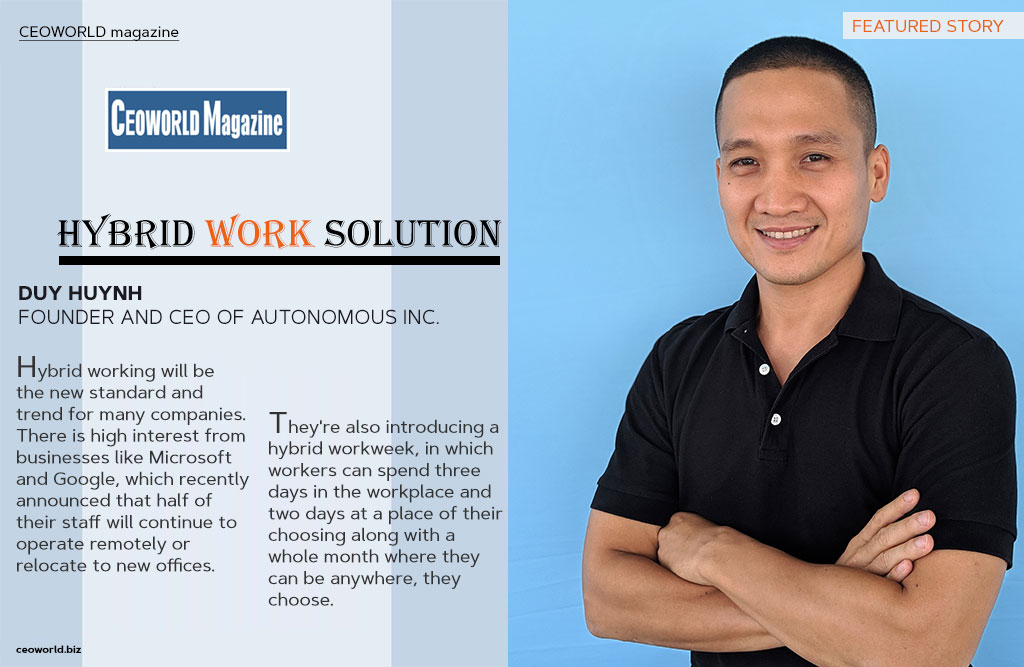CEO Spotlight: Founder and CEO, Duy Huynh, of Autonomous.ai Masters Customer Feedback as Recipe for Success

Duy Huynh is the Chief Executive Officer of Autonomous.ai. Duy has lead Autonomous to be a smart office furniture company for remote and hybrid workers all over the world.
Autonomous was founded in 2015. Can you define, as a leading company in providing smart solutions for offices, where did the idea come from when you first started Autonomous? What was the demand of the market at the time?
Autonomous began as a small group of robotics engineers and tinkerers working out of a cramped apartment in New York City. There were no major “aha!” moments. In 2015, we introduced a few products like the personal robot and the first smart desk on Kickstarter. At the moment, all of our ideas were pretty new, and the reaction was overwhelmingly positive. People were interested. Our first buyers all had an early adopter mentality, making for a very enriching and motivating feedback loop.
We didn’t know what the average consumer needed at the time, so we took the approach of working closely with our supporters to understand their preferences and incorporate their input into our product line. This strategy served us well as we progressed through the company’s formal launch in 2015. It was the best way to ensure genuine valuable growth without being conceited or preoccupied with gimmicks.
Over time, it became apparent that a common trend was a greater success to customer needs.

2020 is a hard year for everyone, especially for 9-5 hour office workers. How has Autonomous helped your customers during the pandemic? How is the demand now post-pandemic?
Desks and chairs were in high demand in 2020, and they also had to be shipped quickly to homes all over the world. People discovered that working on the sofa was terrible for their concentration (and their backs), so we partnered with several companies to provide work from home kits to their employees to keep them safe, comfortable, and profitable.
But just like everyone else, we had our own set of challenges to tackle in 2020.
It was initially impossible to cope with such a significant rise in demand. Many existing logistics networks were unable to keep up with the times. We, like many other businesses, focused heavily on FedEx and UPS, which proved to be a bit of a disaster, as they made complex and abrupt pandemic-related shifts.
We ended up deploying our distribution network. Although we’re still working out future supplies and making better forecasts (which is complicated in a global pandemic), the success is growing. Overall, our clients have been very patient and understanding.
In terms of demand post-pandemic, many people are already settled at home; even those returning to work would find themselves in a very different setting. We’re changing our product lines to concentrate on versatile spaces, incorporating operational tools into our hardware, and optimizing our processes. Our goal is to make the transition as smooth as possible for customers as they find settled environments again.
Autonomous is promoting a ‘hybrid work solution’ for businesses. Are hybrid work demands from your customers? What are your initial thoughts when it comes to hybrid work solutions?
Hybrid working will be the new standard and trend for many companies. There is high interest from businesses like Microsoft and Google, which recently announced that half of their staff will continue to operate remotely or relocate to new offices. They’re also introducing a hybrid workweek, in which workers can spend three days in the workplace and two days at a place of their choosing along with a whole month where they can be anywhere, they choose. Companies who listen to their staff and respond efficiently, in my opinion, can retain and recruit top talent.
Empathy is crucial when it comes to hybrid job strategies. Hotdesking, for example, is once again familiar. Many businesses are attempting to reduce their office space, but how do we do that without alienating workers and causing them to lose focus? Nobody should be without a workspace. No one enjoys a space war. When we create new goods, we have this in mind: productivity and well-being on an equal basis. Both the supervisor and employee need to provide strategies that recognize the human aspect of all of this.
There are three main steps, in our opinion: informing and easing the transition, deploying the latest job model, and finally troubleshooting and analytics. As a result, all we do is focus on making this experience a success for as many businesses as possible, stay vigilant and adaptable.
Work from home customers can be individuals and enterprises. How do you listen to both types of customers about their demands or even predict their future demands?
Our philosophy is to work for people and help them work brighter and healthier.
When the pandemic hit, our team received a flood of stories from our customers through social media, emails, and text messages, which we used to develop new goods.
With our research unit and collaborating with other programs, we analyzed the perspectives and trends in the market. If you’ve worked in a profession long enough, you’ll develop what’s known as ‘instinct.’ You’ll know what to do if you just pay attention to your faithful clients and staff.
What is one trend in the hybrid work model you think will be worldwide popular?
It’s hard to choose one, but two trends that I think go hand-in-hand are hot-desking and what I call “Office Airbnb”, which means offices will become less “fixed” and more dynamic in the way they serve employees.
Spaces will be bookable and movable, used by different people with different needs. Multiple companies may coordinate their employees in shared spaces to increase collaboration and cut costs. This is the hybrid future we envision and we’re always hard at work at Autonomous to present the right solutions that will be needed not just in the next few months, but years down the line.
Bring the best of the CEOWORLD magazine's global journalism to audiences in the United States and around the world. - Add CEOWORLD magazine to your Google News feed.
Follow CEOWORLD magazine headlines on: Google News, LinkedIn, Twitter, and Facebook.
Copyright 2025 The CEOWORLD magazine. All rights reserved. This material (and any extract from it) must not be copied, redistributed or placed on any website, without CEOWORLD magazine' prior written consent. For media queries, please contact: info@ceoworld.biz








